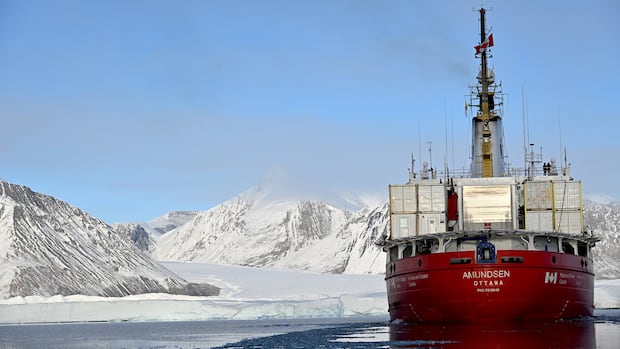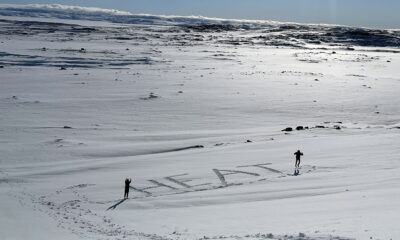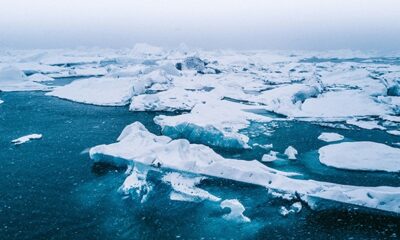Science
UNB Researcher Returns from Arctic Expedition on Sea Ice Impact

A researcher from the University of New Brunswick, Audrey Limoges, has returned from her inaugural scientific expedition to the Queen Elizabeth Islands in September 2023. The mission aimed to investigate the consequences of declining sea ice on the Arctic ecosystem. This area is significant, as it houses approximately 14 percent of the world’s glaciers and ice caps.
Exploring the Arctic Ecosystem
Limoges joined the Canadian Coast Guard icebreaker Amundsen for the expedition, which marks a critical research opportunity in a region characterized by its challenging navigation conditions. She has been conducting Arctic research since 2013 and emphasized the importance of the changing sea ice, stating, “What is happening in the North will actually and is already impacting the system, the Earth system, as a whole.”
The researcher explained that sea ice, distinct from glaciers and ice sheets, plays a vital role in supporting marine life. It serves as a habitat for phytoplankton, or micro-algae, which are essential for the oceanic food web. “Those algae are also known to contain a lot of lipids, so it means that they are very nutritious for organisms,” Limoges noted, highlighting the interconnectedness of the Arctic ecosystem.
During her expedition, Limoges and her team were tasked with mapping the seabed and collecting data on sediment structures. The sediments contain microfossils and molecules that reflect historical sea-ice conditions, which are crucial for understanding past and present ecological dynamics.
Challenges and Observations
Operating within a limited timeframe of just 28 days, the team had to maximize their research efforts around the clock. “There is always someone working,” Limoges described, indicating the intense schedule that dictated their daily rhythm. “The rhythm is dictated by the stations where we are sampling.”
As climate change continues to impact the Arctic, Limoges observed that most sea ice is now classified as first-year ice, rather than the more resilient multi-year ice. This shift can profoundly affect marine circulation patterns, leading to an influx of fresh water into the oceans, which disrupts the delicate balance of marine ecosystems.
Limoges expressed a deep appreciation for the opportunity to conduct research in such a critical area, noting the responsibility to do so with respect for the northern communities that depend on these ecosystems. “Studying them is actually something that is not given,” she remarked, stressing the importance of ethical research practices.
As climate conditions evolve, the findings from this expedition could have significant implications for understanding the broader impacts of sea ice loss on global climate systems and marine biodiversity. Limoges’s work contributes to the growing body of knowledge necessary for addressing these pressing environmental challenges.
-

 World4 months ago
World4 months agoScientists Unearth Ancient Antarctic Ice to Unlock Climate Secrets
-

 Entertainment4 months ago
Entertainment4 months agoTrump and McCormick to Announce $70 Billion Energy Investments
-

 Lifestyle4 months ago
Lifestyle4 months agoTransLink Launches Food Truck Program to Boost Revenue in Vancouver
-

 Science4 months ago
Science4 months agoFour Astronauts Return to Earth After International Space Station Mission
-

 Technology2 months ago
Technology2 months agoApple Notes Enhances Functionality with Markdown Support in macOS 26
-

 Top Stories3 weeks ago
Top Stories3 weeks agoUrgent Update: Fatal Crash on Highway 99 Claims Life of Pitt Meadows Man
-

 Sports4 months ago
Sports4 months agoSearch Underway for Missing Hunter Amid Hokkaido Bear Emergency
-

 Politics3 months ago
Politics3 months agoUkrainian Tennis Star Elina Svitolina Faces Death Threats Online
-

 Politics4 months ago
Politics4 months agoCarney Engages First Nations Leaders at Development Law Summit
-

 Technology4 months ago
Technology4 months agoFrosthaven Launches Early Access on July 31, 2025
-

 Top Stories1 week ago
Top Stories1 week agoFamily Remembers Beverley Rowbotham 25 Years After Murder
-

 Entertainment4 months ago
Entertainment4 months agoCalgary Theatre Troupe Revives Magic at Winnipeg Fringe Festival





















